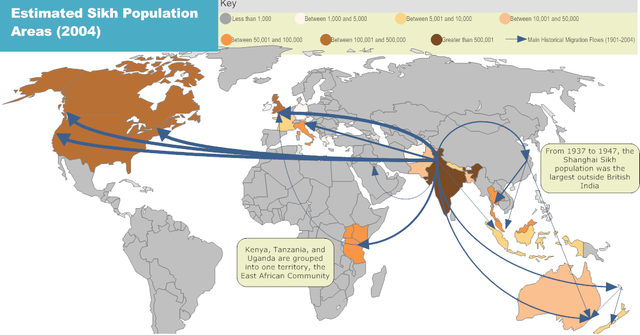
Image source Wikipedia
by Arooba Hamid 6 April 2023
The Sikh-majority state of Punjab in India recently witnessed a significant episode of governmental crackdown, characterized by massive detentions, the deployment of paramilitary personnel, and a communication blackout, which impacted a sizeable population. These measures provoked resentment and frustration among the Sikh diaspora. Presently, the Indian Punjab is witnessing state-wide cordon and search operations, wherein a large number of individuals associated with Amritpal Singh are being detained. Moreover, Section 144 of the Indian Code of Criminal Procedure has been enforced in numerous regions of Punjab, prohibiting the assembly of more than four individuals, with charges of rioting imposed against violators of the order. These measures have raised concerns of possible extrajudicial killings of Sikhs under the guise of “fake encounters” amidst the current situation.
Amritpal Singh recently emerged as a significant figure in Punjab’s religio-political sphere, after taking over the leadership of “Waris Punjab De” (Heirs of Punjab). ‘Waris Punjab De’ is an organization formerly led by the actor-activist Deep Sidhu prior to his death in February 2022. Singh leads the group which actively promotes the creation of Khalistan – an independent and autonomous state specifically intended for the Sikh community.
Ever since Amritpal Singh Sandhu took over the lead of ‘Waris Punjab De’ after the death of Deep Sidhu, the Indian state machinery started harassing him by cancelling arms licences of his guards and detaining his friends. The sudden demise of Deep Sidhu and the killing of Sidhu Moosewala have caused great distress among a considerable proportion of Punjab’s youth. Despite their distinct appeals, both figures advocated for an autonomous political stance on matters relevant to Punjab and the Sikh community. Due to the lack of exemplary figures, Amritpal Singh attempted to occupy this void, at least for a segment of Sikh youth.
Sikh diaspora has raised apprehensions over the crackdown harassing Sikh population in Indian Punjab and elsewhere in India. As a response, a protest took place at the Indian consulate in San Francisco. During the protest, some Sikhs raised pro-Khalistan slogans and also installed two Khalistani flags at the site. In addition, Author and poet Rupi Kaur, shared a post by the World Sikh Organization of Canada (WSO) which stated that “mass arrests of Sikh activists are taking place in Punjab. At least 78 people have been arrested. Internet and SMS have been shut down in areas along with crackdowns on gatherings. Sikh media outlets and pages have been blocked.”
World Sikh Organization itself raised concerns stating that “the World Sikh Organization of Canada (WSO) condemns the security operations in Punjab to arrest Sikh leader, Amritpal Singh. Indian authorities have announced the mass suspension of internet services across Punjab citing a threat to “public order by incitement to violence.” We are also deeply concerned that the confusion around Amritpal Singh’s detention may be used to orchestrate a false encounter and facilitate his extrajudicial murder. We call on the Canadian Government to demand accountability from India and call for the immediate restoration of civil rights and internet services in Punjab.”
Moreover, Amar Singh of Australia-based Sikh charity organization expressed concerns over human rights violations by police. It was stated that “We have serious concerns over the unprecedented attempt by the Indian government and police in Punjab to trample upon the democratic rights of Sikhs.
Members of the Sikh diaspora have expressed concerns regarding potential unlawful targeting by the law enforcement officials, citing past incidents during the 1980s and 1990s when thousands of young men were arbitrarily charged for being associated with the Khalistan movement. A documentary titled “Punjab Disappeared” reported that 8257 disappearances, extrajudicial killings, and secret cremations took place across Punjab between 1984 and 1995.
The Sikh community fears that there might be another round of fake encounters and enforced disappearances. They have therefore called on their respective governments to demand accountability from the BJP government, in order to prevent the repression of civil rights and ensure the preservation of democratic norms.
The writer is a Lahore-based independent researcher.
